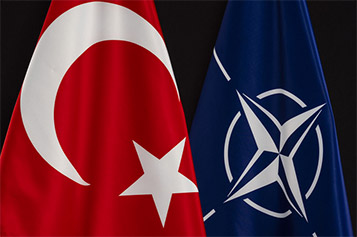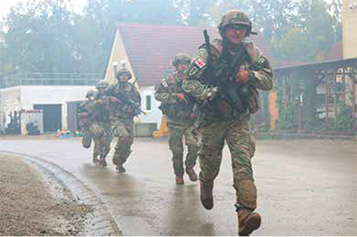Publications
Turkey Holds the Nordic Countries at Gunpoint: Implications for NATO  By Eugene KOGAN, Tbilisi-based defence and security expert By Eugene KOGAN, Tbilisi-based defence and security expert
It is a paradox that two democratic Nordic countries that are willing to join NATO and become interoperable with it are kept at bay by pseudo-democratic NATO member Turkey. As long as this situation persists, Russia strategically has the last laugh. This could have been avoided if the proposed policy recommendations had been implemented by NATO some time ago.
To begin with, it is crucial to recall a preamble to the North Atlantic Treaty (Washington Treaty 1949), namely: ‘The Parties to this Treaty are determined to safeguard the freedom – founded on the principles of democracy, individual liberty and the rule of law’. Obviously, these principles have been repeatedly trampled upon by Turkey’s President Recep Tayyip Erdogan over the last decade. And now, two democratic candidates for NATO membership, Finland and Sweden, have to fulfil conditions virtually imposed by the pseudo-democratic government of Turkey. This is a worrying paradox. READ MORE
Publications
EU’s New Observer Mission in Armenia: What Next?  By Benyamin POGHOSYAN, PhD, Chairman, Center for Political and Economic Strategic Studies By Benyamin POGHOSYAN, PhD, Chairman, Center for Political and Economic Strategic Studies
On January 23, 2023, the Council of the European Union agreed to establish a civilian European Union Mission in Armenia (EUMA) under the Common Security and Defence Policy. The mission’s objective is to contribute to stability in the border areas of Armenia, build confidence on the ground, and ensure an environment conducive to normalization efforts between Armenia and Azerbaijan supported by the EU. EUMA will have an initial mandate of two years, and its operational headquarters will be in Armenia. The first EU mission was deployed in Armenia in late October 2022 for two months. On December 19, 2022, the mission left Armenia, but discussions were underway for the deployment of a new, longer, and larger mission. READ MORE
Publications
The Georgian Perspective on Shifting Security Dynamics in the Caucasus  By Eugene KOGAN, Tbilisi-based defence and security expert By Eugene KOGAN, Tbilisi-based defence and security expert
Despite the ongoing Russian war against Ukraine and the continuing reassurances coming from NATO that Georgia’s interests are being taken into consideration, Georgia’s NATO accession process has come to an impasse. Instead of reaching a national consensus and keeping society united, the population remains divided and polarised. The only progress that can be highlighted is the forthcoming manufacturing of unmanned aerial vehicles and the establishment of a Cyber Security Command.
Difficult Realities
Notwithstanding the deceptive external calm vis-à-vis ongoing skirmishes between Armenia and Azerbaijan, Iran’s military exercises on the border with Azerbaijan, and Turkey’s ongoing operations against the PKK in Syria, Georgia remains vulnerable to any potential conflict with Russia. What is more, Georgia has no allies or partners that will come to its rescue in case of military conflict with Russia. Georgia is in a ‘grey area’ with respect to Russia, and will therefore need to rely on its own strengths and resourcefulness. READ MORE
Publications
Armenia should Secure Deployment of New EU Observer Mission  By Benyamin POGHOSYAN, PhD, Chairman, Center for Political and Economic Strategic Studies By Benyamin POGHOSYAN, PhD, Chairman, Center for Political and Economic Strategic Studies
Since the end of the 2020 Nagorno-Karabakh war, Azerbaijan has pursued a strategy based on coercive diplomacy and military blackmail in negotiations with Armenia. Azerbaijan seeks to force Armenia to accept its two primary demands – to accept that Nagorno-Karabakh as a territorial administrative unit does not exist anymore and to provide Azerbaijan with a corridor via Syunik to reach the Nakhichevan Autonomous Republic. Military incursions into Armenia are one of the main tools used by Azerbaijan to push forward with its coercive strategy. As a result of multiple aggressive actions, Azerbaijan has occupied up to 200 square kilometers of Armenian territory. Russia and the CSTO provided muted reactions to Azerbaijani aggression, so Armenia decided to involve other international players to deter further attacks. READ MORE
Publications
What to Expect From the Azerbaijani–Armenian Peace Process in 2023
 By Fuad SHAHBAZOV, Baku-based independent regional security and defence analyst By Fuad SHAHBAZOV, Baku-based independent regional security and defence analyst
The end of 2022 marked another round of confrontation between Azerbaijan and Armenia in the Karabakh region with the involvement of Russian peacekeeping forces. The standoff began in early December, when the Russian peacekeeping contingent in the separatist Karabakh region denied access to Azerbaijani officials from the Ministry of Economy, Ministry of Ecology and Natural Resources and the state-owned mining company AzerGold CJSC from carrying out on-site inspections of the Gizilbulag gold deposits and the Demirli copper-molybdenum deposits to evaluate potential risks to the environment. While Azerbaijani state officials were deprived of free movement inside the separatist portion of Karabakh by the peacekeeping mission, it fuelled skepticism in Azerbaijani and Armenian societies regarding Russia’s role in the process. READ MORE
Publications
No Peace Is Possible with Zero Trust  By Benyamin POGHOSYAN, PhD, Chairman, Center for Political and Economic Strategic Studies By Benyamin POGHOSYAN, PhD, Chairman, Center for Political and Economic Strategic Studies
On December 12, 2022, Azerbaijan blocked the Lachin corridor, the only route connecting the self-proclaimed Nagorno Karabakh Republic with the outside world. The corridor is blocked by "eco–activists," who initially demanded access for the relevant Azerbaijani state institutions to monitor the copper-molybdenum mine in Nagorno Karabakh. They argued that Nagorno Karabakh authorities did not meet international standards. However, very soon, the list of demands started to increase – the resignation of the newly appointed state minister of the self-proclaimed Nagorno Karabakh Republic, Ruben Vardanyan, and the establishment of an Azerbaijani checkpoint in the Lachin corridor were among the new demands added. Anyone, who has at least a basic understanding of the Nagorno-Karabakh conflict, and has followed the developments there since the end of the 2020 Nagorno Karabakh war, has no doubts that what has been going on in the Lachin corridor for almost a month is connected with geopolitics, rather than benign environmental concerns. READ MORE
Publications
Iran’s Drone Exports to Armenia Could Undermine Peace Process in Karabakh
 By Fuad SHAHBAZOV, Baku-based independent regional security and defence analyst By Fuad SHAHBAZOV, Baku-based independent regional security and defence analyst
The recent war of words between Azerbaijan and Armenia, and the developments of the last several weeks, have demonstrated that both sides are far from inking a peace deal, which was promised by the end of 2022. Although both states vowed to intensify joint efforts on the final peace treaty in October 2022 on the sidelines of the Prague summit, little has been done since. On the contrary, the failure to hold peace negotiations has been magnified by Russian President Vladimir Putin’s controversial statements regarding Moscow’s non-recognition of Azerbaijan’s sovereignty over Karabakh, which have immensely increased the risks of renewed hostilities between Baku and Yerevan. Although Russia maintains the role of “key mediator” on the Karabakh issue, Azerbaijan now openly demonstrates its discontent over Moscow’s role in the peace process, particularly after the merely symbolic meeting in Sochi on October 3. READ MORE
Publications
No Peace Should not Mean War  By Benyamin POGHOSYAN, PhD, Chairman, Center for Political and Economic Strategic Studies By Benyamin POGHOSYAN, PhD, Chairman, Center for Political and Economic Strategic Studies
The developments of the last three weeks have proved that Armenia and Azerbaijan are far from signing a peace agreement, at least by the end of 2022. There is a danger that Azerbaijan may interpret this as a failure of the peace process and use this as a "moral justification" to launch a new large-scale aggression. If this happens, it will push Armenia and Azerbaijan further back from any chance to reach an agreement and deepen the mutual mistrust.
In recent months Armenia – Azerbaijan negotiation process passed through several ups and downs. The September 13-14, 2022, Azerbaijani aggression seemed to jeopardize the fragile achievements reached during the three Brussel summits held in April, May, and August 2022. However, immediately after the ceasefire reached on September 14, there was a new push toward reaching a peace agreement. Armenian and Azerbaijani foreign ministers met in New York in late September and Geneva on October 2; Secretary of the Armenian Security Council Armen Grigoryan had a meeting with President Aliyev’s top foreign policy aide Hikmet Hajiyev in Washington on September 27, 2022. READ MORE
|
|